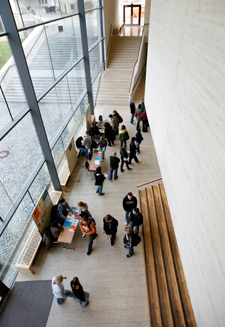
Creating knowledge since 1502
News
Pathogen hijacks fruit ripening program in citrus plants
19 Dez 2025 | The bacterium Xanthomonas citri activates parts of the ripening programme in the infected leaves of its host plant, which normally causes the fruit to become soft and sweet. This allows it to use the released sugar as food and grow up to a hundred times faster. An international research team led by the University of Tübingen and with the help of scientists at MLU has discovered exactly how this process works in detail. The results were published in “Science” and provide new approaches for combating citrus canker that is caused by X. citri.
Tuberculosis: Scientists develop novel drug candidate for combating resistant pathogens
08 Dez 2025 | Researchers at MLU have developed a promising new substance for targeting bacteria that cause tuberculosis. The team have produced a compound that inhibits the pathogens’ ability to produce energy and causes them to die. Established drugs work in a similar fashion, but the pathogen is becoming increasingly resistant to these medications. The study was conducted jointly with other researchers from Germany, the USA and Canada and its findings were published in the “Journal of Medicinal Chemistry”.
Targeted protein degradation: Researchers find new way to combat harmful proteins in tumour cells
18 Nov 2025 | A new active substance attacks a key protein in tumour cells, leading to complete degradation. In cell experiments, this caused cancer cells to lose their protection and die. The active substance was developed by researchers at the MLU and the University Medical Center Mainz. Other substances usually try to inhibit the activity of the protein “checkpoint kinase-1” (CHK1). However, if the protein is completely broken down, a chain reaction is triggered which leads to other tumour proteins being destroyed. Thus, the cancer cells are further weakened. The new study was published in the journal “Angewandte Chemie”.
Researchers develop ultrasmall, light-sensitive nanoparticles that could serve as contrast agents
22 Sept 2025 | A novel class of light-sensitive nanoparticles may one day enable new approaches to medical imaging. They were developed by a research team at MLU. The particles absorb laser light and convert them into heat thereby changing their internal structure, similar to folded proteins. The research was published in the journal “Communications Chemistry”.
Plants, islands and climate change: biologist Julian Schrader receives an ERC Starting Grant
04 Sept 2025 | Dr Julian Schrader has been awarded one of the European Research Council’s (ERC) coveted Starting Grants to study island plant life. The biologist will use the 1.5 million euros grant to investigate the interaction between climate change and the spread of plant species. To do this, he will relocate from Macquarie University in Sydney, Australia, to MLU and the German Centre for Biodiversity Research Halle-Jena-Leipzig (iDiv). The ERC Starting Grant is one of Europe’s most prestigious research awards.
Cognitive Behavioural therapy can alter brain structure and boost grey matter volume, study shows
27 Aug 2025 | Psychotherapy leads to measurable changes in brain structure. Researchers at Martin Luther University Halle-Wittenberg (MLU) and the University of Münster have demonstrated this for the first time in a study in “Translational Psychiatry” by using cognitive behavioural therapy. The team analysed the brains of 30 patients suffering from acute depression. After therapy, most of them showed changes in areas responsible for processing emotions. The observed effects are similar to those already known from studies on medication.









